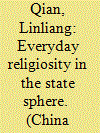| Srl | Item |
| 1 |
ID:
143588


|
|
|
|
|
| Summary/Abstract |
Zoroastrian theology's emphasis on living the good life; the encouragement to create material wealth with the accompanying social obligations to put it to good use, explains the immensely extensive welfare system put in place by the Parsi community in India. Following the Arab conquest of Iran, the diminution in numbers and stature of the Zoroastrians in the ancestral land and the subsequent Parsi settlement in India, meant the marginalization of a people whose forebears once ruled a mighty empire. Once the Parsis acquired financial success, they put in place a community-wide network of benevolent institutions. This was followed by extending a muscular benevolence to the Zoroastrians of Iran, which evolved into a highly structured undertaking to ensure the safeguarding of the community from virtual extinction. Thus, Zoroastrian philanthropy was as much a reaffirmation of religious traditions as it was a means of self-preservation.
|
|
|
|
|
|
|
|
|
|
|
|
|
|
|
|
| 2 |
ID:
144075


|
|
|
|
|
| Summary/Abstract |
The religious sector in contemporary China is often portrayed as resisting or negotiating with an interventionist state in order to survive or protect its autonomy. This article, however, shows how it enters the state sphere and imbues the presumed state agents. By exploring folk beliefs and practices in a state-run orphanage (such as philanthropists’ activities, which they related to accumulation of karmic merits, childcare workers’ discourses, conduct associated with predestined relationships and baby ghosts, and institution officials’ preoccupation with palmistry, fortune telling and karmic retribution), and the impact of folk belief and practices on the working of the state apparatus, this study aims to enrich current scholarship by looking at state–religion interactions beyond the religious sphere and also reversing the image of Chinese religions as merely passive or reactive actors.
|
|
|
|
|
|
|
|
|
|
|
|
|
|
|
|
| 3 |
ID:
082396


|
|
|
|
|
| Publication |
2008.
|
| Summary/Abstract |
This article examines how the Hong Kong Special Administrative Region government squares the welfare circle. Because of the constrained institutional pathway of the established welfare system, the government is not successful in either reducing public expenditures or raising taxes. The article argues that it is important to look into the role of institutional design in the management of public expectations
|
|
|
|
|
|
|
|
|
|
|
|
|
|
|
|